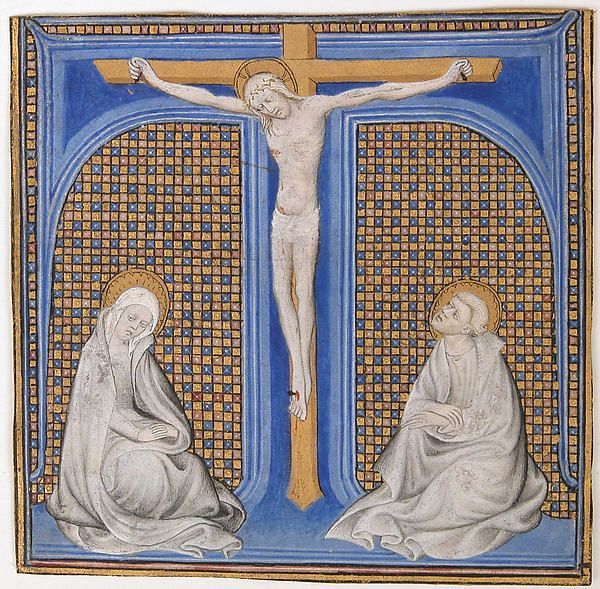The Last Supper
Prayer: In the preparatory prayer I will beg God our Lord for the grace that all my intentions, actions, and operations may be directed purely to the praise and service of His Divine Majesty.
History: This will consist in calling to mind the history I have to contemplate. Here it will be to recall that Christ our Lord sent two of his disciples from Bethany to Jerusalem to prepare the Supper, and afterwards, He Himself went there with His disciples. After they had eaten the Paschal Lamb, He washed their feet, and gave his Most Sacred Body and Precious Blood to his disciples.
Composition of place: It will be to see the house and room of the Last Supper, Jesus and his disciples around him.
Prayer of petition: I will ask for the grace I desire. Here it will be to ask for sorrow, compassion, and shame because the Lord is going to His suffering for my sins.
In this contemplation I will see the persons at the supper, and reflect upon myself. I will listen to his conversations and see what they are doing and I will seek to draw some fruit from it. I will consider how the divinity hides itself, how it is hidden in the Sacrament of the Eucharist. I will contemplate the hidden Lord. You cannot see either his Divinity or his Humanity: Everything is hidden, everything is Faith. This Mystery was instituted at the Last Supper.
Suddenly Jesus did an unusual thing, not mentioned in the precepts for the Paschal dinner, “He took the bread, said the blessing, broke it, and gave it to them, saying: ‘This is My Body, which will be given for you; do this memory of Me. And likewise, the cup after they had eaten, saying, “This cup is the New covenant in My Blood which will be shed for you.’” (Luke 22: 19-20)
This is the Mystery of faith and the Mystery of Love. ‘When Jesus knew that his hour had come to depart out of this world to the Father, having loved his own who were in the world, he loved them to the end.” (John 13: 1)
The Holy Eucharist is the prelude of his works of love. It is the prelude of His Passion and Cross, or better it is its anticipation.
All love demands union; the more ardent the love, the more complete the union it seeks. The love of our Lord for us is no exception. As St. John Chrysostom tells us, our Lord instituted the Blessed Eucharist so that we might become one entity with Himself, united to Him as the head is united to the body, as food is united to one that consumes it, “for this is the desire of the ardent lovers.”
How can we express what this action signifies!
Perhaps our best plan is to quote the Council of Trent: “Our Savior, when about to depart out of this world to the Father, instituted this sacrament, in which He poured forth, as it were, the riches of His divine love towards men, making a remembrance of His wonderful works.” (Council of Trent, Sess. 13, chap. 2)
It was not enough for Him that He should become one of ourselves by adopting a human nature like our own. It was not enough that He should share the hardships of a life like our own, that He should suffer and die and atone for our sins, in our name.
He loved us, and He would not rest until He should be completely united to us. And in His love He devised this most extraordinary method of union, in which He Himself becomes our food! Truly a tremendous lover!
His words are full of meaning: “Amen, Amen, I say unto you: Except you eat of the flesh of the son of Man, and drink of his blood, you shall not have life in you. Whoever eats my flesh and drinks my blood, has everlasting life, and I will raise him up in the last day. For my flesh is real food, and my blood is drink indeed. He that eats my flesh and drinks my blood, abides in me and I in him.” (John 6: 54-57)
When one loves, one goes forth as it were from oneself and enters into the beloved, and holds the will and the good of the beloved as one’s own.
When one loves, one identifies oneself with the beloved, and wills and acts for the sake of the beloved as for one’s own sake, making the beloved another self.
The tragedy of all human love, even in its highest forms, is that complete identification is impossible.
But with God all things are possible and the loving Heart of Jesus has designed this way of achieving this union and convincing us of its intimacy by means of Holy Communion.
If we may sum up the effects of Holy Communion in a few words, we would say it produces a “transforming union with Christ.”
It unites us to Him, as we have seen, although He is our food in this sacrament and normally food is changed into body of those that eat it, yet here it is we who are changed into Him.
In His love, He makes Himself the food of our souls.
Unlike ordinary food, which produces its effects by being changed into our substance, this divine food changes us into itself.
It is the beginning of heaven, where we shall be united to Him forever. Even here, we shall never cease to be ourselves—we shall never lose our own personal individuality—but we shall be renewed and remade in the likeness of God Himself. That renewal begins even here below in the reception of this sacrament. The Council of Florence tells us that:
Every effect which material food and drink produce in regard to corporal life -by sustaining it, by increasing it, by repairing it, and by refreshing it, this sacrament produces in regard to our spiritual life… By it, we are withdrawn from evil, strengthened in good, and we progress with an increase of virtues and graces. (DB, 698)
With St. Paul we can cry out: “I live, now not I: but Christ lives in me.” (Gal 2:20)
And who is He to whom we are in such a form united? Who is He that comes into our body under the sacramental species?
Jesus Christ, the Son of God, the Second Person of the Blessed Trinity; He of whom St. John says: All things were made by Him; the maker of all things, and the model of all things, the artist, the architect, the composer, the craftsman, the poet…
And this Word of God comes to us in Holy Communion and makes us one with Himself!
Words fail! For all human words are useless; but if in desperation we may pick out one phrase, that may be a fitting praise, this is: “My God and my all”
Truly, indeed, one Communion can make a Saint. There is nothing in ourselves or in our past that one Communion cannot more than repair. Listen to St. Thomas: This sacrament contains in itself Christ crucified [Christum passum]. Then, whatever is the effect of the Passion of our Lord all that is likewise the effect of this sacrament.” (In Joan, 6, lect. 6, n.7)
The Blessed Eucharist is the “perfect sacrament of the Passion,” for it contains Christ and the whole power of His Passion.
This sacrament is a pledge of our future glory, because it was by His Passion that Christ opened for us the gates of heaven.
Through its relation with the Passion it also strengthens us against the attacks of the devil. Saint John Chrysostom exhorts us to remember that, “leaving this sacred table we are like lions, breathing flames, and we are made a terror to the demons.”
Truly, indeed, one Communion can make a Saint.
The saints go to Holy Communion in complete poverty of spirit. It is not a question of supplying for their deficiencies, of completing themselves— it is a question of replacing their nothingness by the fullness of Christ. Their past life—good and bad—their sins and merits, count as nothing in their eyes; their whole hope, their whole desire, their whole self, is found in the Blessed Sacrament.
Like St. Paul they exclaim: One thing I do: forgetting the things that are behind, and stretching forth myself to those that are before, I press towards the mark, to the prize of the supernal vocation of God in Christ Jesus…! We look for the Savior our Lord Jesus Christ, who will reform the body of our lowness, made like to the body of his glory…” (Phil 3: 13-20)
For we cannot do better than to adopt the motto of St. Columban: Christi sim us, non nostri – Let us belong to Christ, and not to ourselves.
Finally, in this Last Supper Christ whished to begin his “School of Love.”
And his lessons are repeated in every age in every place, when the Holy Mass is celebrated.
In each altar his love is remembered, his love is renewed. Then, we can say that the Holy Eucharist becomes a “School of Love.”
In this School we are going to learn that love without sacrifice doesn’t exist, in this School we are going to learn that no one has greater love than this: to lay down one’s life for one’s friends.
This is the School of Saint, Apostles, Pastors, Doctors, Virgins, Holy Men and Women. All of them understood that love calls to imitation.
In this school Saint Thomas Aquinas learned to write,
O You, our reminder of the Crucified,
Living Bread, the life of us for whom He died,
Lend this life to me, then; feed and feast my mind,
There be you the sweetness man was meant to find.
These are not mere words. This is the school of Saints and in this place Saint Therese of Lisieux among others learned to say:
I offer myself as a victim of holocaust to your merciful love, asking you to consume me…
I thank You, O my God! For all the graces You have granted me, especially the grace of making me pass through the crucible of suffering.
May this martyrdom…cause me to die and may my soul take flight without any delay into the eternal embrace of Your Merciful Love.
I want… at each beat of my heart to renew this offering… until the shadows having disappeared, I may be able to tell You of my Love in an Eternal Face to Face!

Take, Lord,
and receive all my liberty, my memory, my understanding, and my entire will, all that I have and possess. Thou hast given all to me. To Thee, O Lord, I return it. All is Thine, dispose of it wholly according to Thy will. Give me Thy love and Thy grace, for this is sufficient for me.
(Spiritual Exercises #234. Louis Puhl SJ, Translation.)



